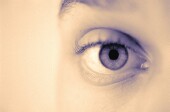
THURSDAY, Oct. 7 (HealthDay News) — When it comes to attitudes, habits and experience regarding eye health, it appears men really are from Mars and women are from Venus, a new survey reveals.
“The good news is the majority of both men and women understand the importance of maintaining eye and visual health through regular comprehensive eye exams,” said Dori Carlson, president-elect of the American Optometric Association, which conducted an online survey over the course of a week last April.
Most people, regardless of gender, have seen an eye doctor in the last two years, the poll indicates.
But based on the responses from a nationally representative sampling of more than 1,000 American adults, that is where gender agreement on all things visual gets a little fuzzy.
For example, more women than men say they suffer from seasonal eye allergies that lead to itchy, watery eyes (73 percent versus 67 percent). More men, however, miss work because of such eye allergies (16 percent versus 9 percent).
Although both men and women said the worst result of such allergies was difficulty participating in outdoor recreational activities, men said their number two problem was interference with sleep, while women cited difficulty with thinking and concentrating.
The sexes have a different approach when it comes to buying sunglasses, as well. Men are more likely than women to make the mistake of thinking that name-brand glasses are better for the eyes (36 percent versus 27 percent). And women are slightly more focused than men on making sure a pair of sunglasses offers UV protection (35 percent versus 28 percent).
Men and women do agree, however, on what foods are good for eye health. A majority of both point to carrots as the best food for eyes, although more men (14 percent) were likely to correctly identify spinach as the better food for promoting eye health than women (11 percent).
More men than women say they have vision issues from sitting in front of their computers for too long (59 percent versus 53 percent). And although a majority of both genders say they take computer breaks every 30 to 60 minutes, more women (17 percent) than men (13 percent) say they take a vision break every 20 minutes.
However, on some issues there was universal agreement: Both men and women say they have worn their daily-wear contact lenses longer than eye experts advise.
The poll also revealed that at age 40 most Americans begin to experience some eyesight changes, but, again, the way men and women respond to age-related issues differs. While more than a third of men turn to brighter lights to solve their problems, a third of women choose to cut back on night driving.
The loss of good vision over time leads women to worry about being unable to read, while men fear being unable to see the people they love. Both sexes, however, agree on one thing: Their biggest vision concern is that bad eyesight could render them unable to live independently.
More information
For more on vision health, visit the American Optometric Association.

